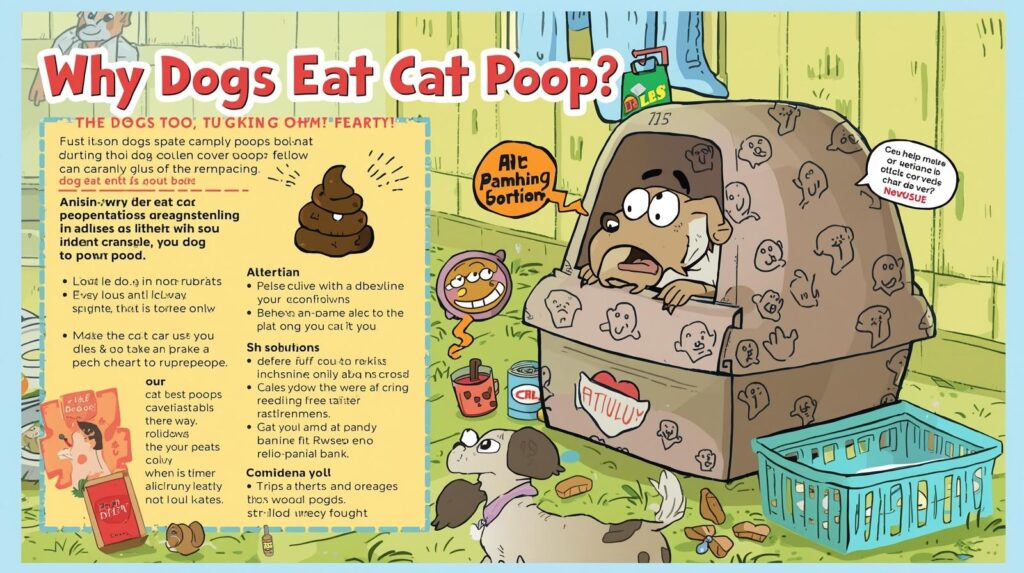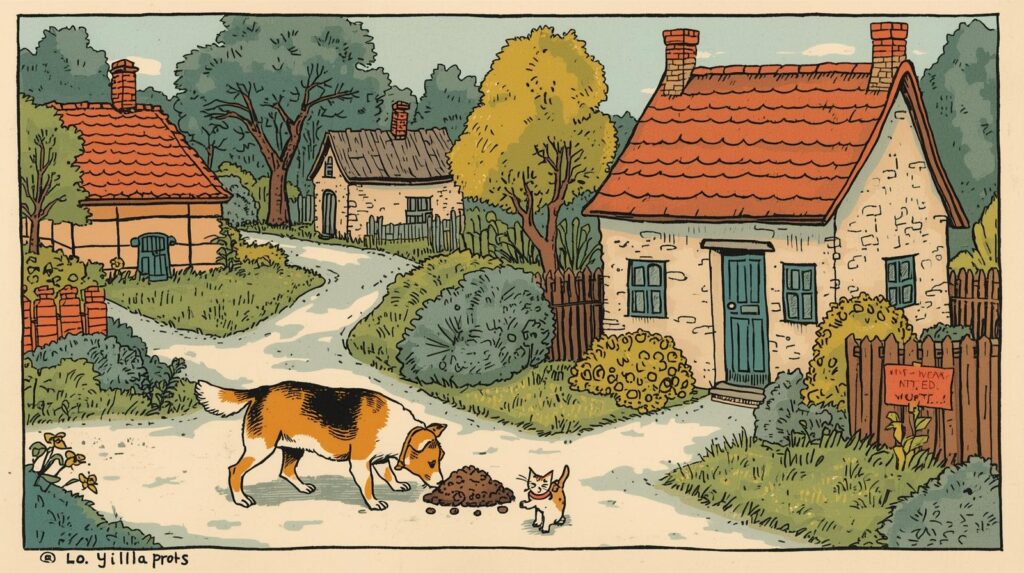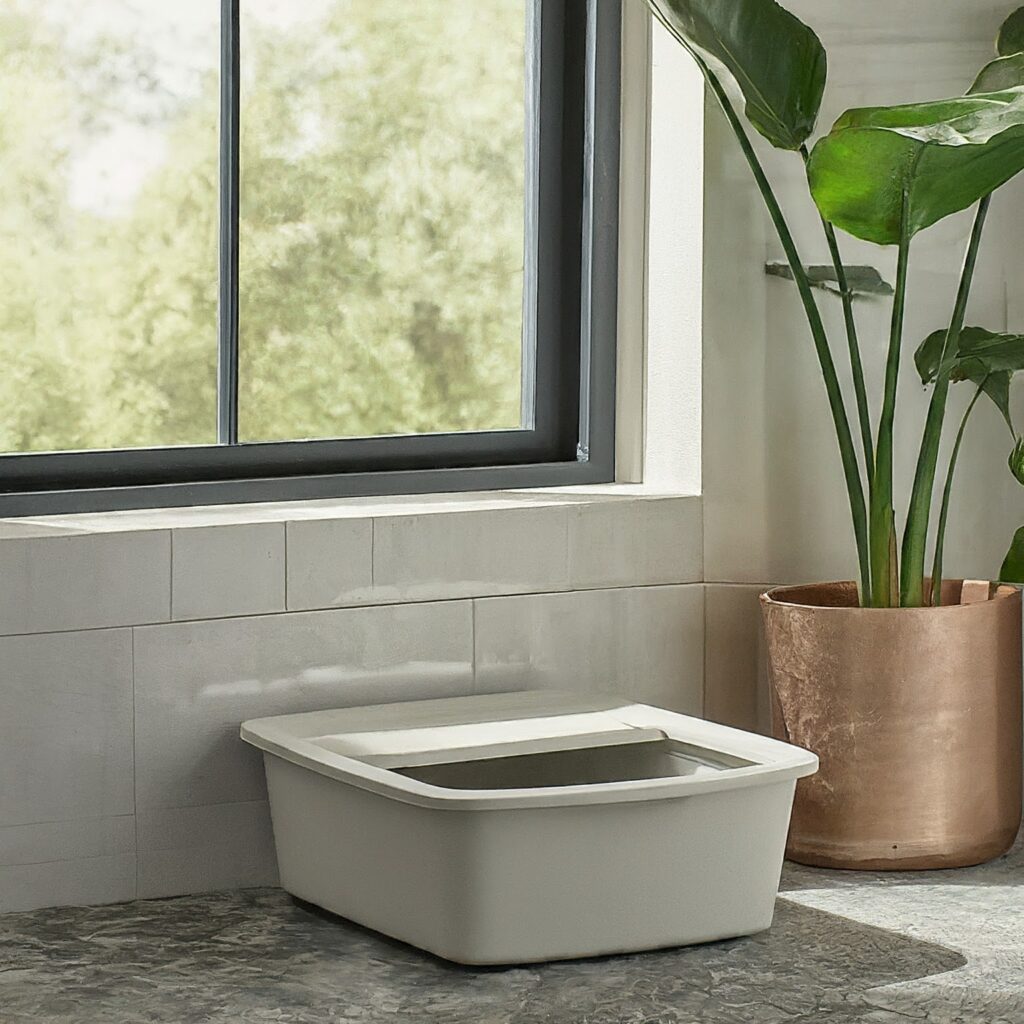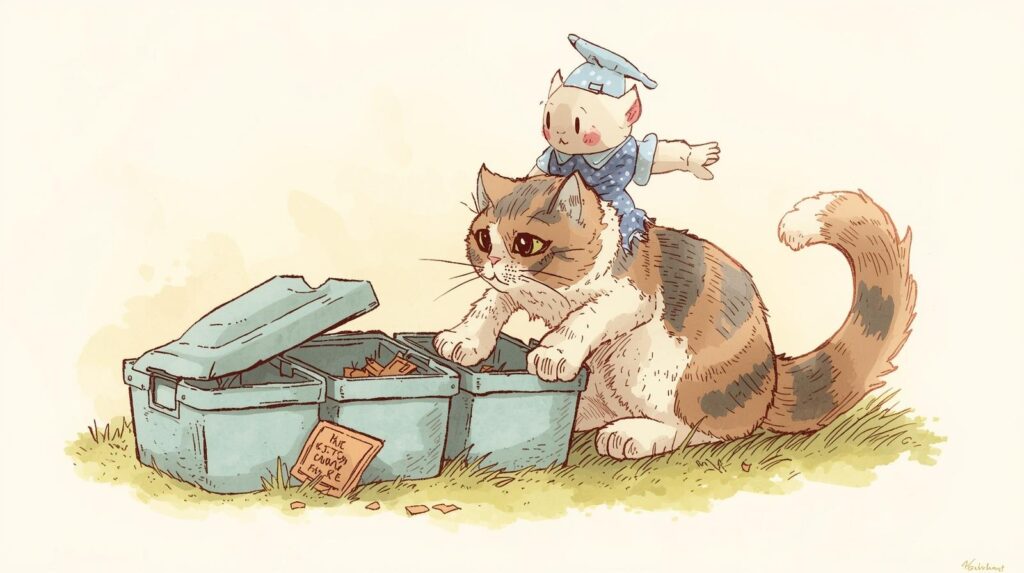
If you’ve ever walked into a room and discovered your dog digging in the litter box, you’ve likely wondered: why do dogs eat cat poop? It’s one of the strangest and most frustrating behaviours for pet owners, yet surprisingly common. This act even has a scientific name — coprophagia — which refers to animals consuming faeces. While it may sound alarming, it doesn’t always signal a serious health issue.
Dogs may be driven to cat poop out of curiosity, nutritional needs, or even instinct. However, it’s not just gross; it can also expose them to bacteria and parasites. That’s why understanding the reasons behind this behaviour — and learning why dogs eat cat poop? How to break the habit is essential for every responsible dog owner.
In this article, we’ll dive deep into the main reasons dogs eat cat poop, explore whether it’s normal or concerning, discuss potential health risks, and share practical training tips and home adjustments. We’ll also recommend helpful products and answer some of the most common questions pet parents ask. By the end, you’ll feel empowered to stop this behaviour while keeping your dog happy, healthy, and safe.
Table of Contents
Why Do Dogs Eat Cat Poop? (Main Reasons Explained)
The first step in solving any problem is understanding why it happens. Here are the most common reasons:
- Curiosity and Smell Attraction
To us, cat poop smells foul. To dogs, however, the scent is powerful and sometimes even appealing. Dogs are scavengers by nature, and strong odours can attract them. - Nutritional Deficiency
Sometimes, a dog might eat cat poop because its body is craving nutrients. Cat food is protein-rich, and undigested bits in faeces may smell like a “snack” to a dog lacking certain vitamins or minerals. - Instinctive Behavior
In the wild, dogs and their relatives often scavenge. Eating faeces can be an instinctive behaviour, especially in puppies exploring their environment. - Attention-Seeking or Stress
Why do dogs eat cat poop? Sure, I can tell you reasons some dogs do it because it gets a reaction from their owner. If your dog feels bored, stressed, or ignored, it might repeat the behaviour to get your attention.
Understanding these causes helps us decide whether this is a harmless quirk or a habit that needs intervention.
The Science Behind Coprophagia in Dogs
When pet owners first ask, why do dogs eat cat poop?” they are often surprised to learn that this behaviour has been studied for decades. In veterinary medicine, it’s officially known as coprophagia, a term that describes stool-eating behaviour in animals. While unpleasant to humans, it’s far from rare in the canine world.
Why Dogs Are Naturally Drawn to Poop
Dogs have evolved as opportunistic scavengers. Unlike cats, who are strict carnivores, dogs can eat a wide variety of foods — from meat scraps to plant matter, and unfortunately, even feces. Researchers explain that faeces may still contain undigested nutrients, especially when it comes from animals on protein-rich diets like cats. To a dog’s sensitive nose, cat faeces can smell like leftover food rather than waste.
Coprophagia as a Survival Instinct
Why do dogs eat cat poop? Scientific studies suggest that in the wild, eating faeces could serve two purposes:
- Den hygiene: Mother dogs instinctively eat their puppies’ waste to keep the nest clean and reduce the risk of attracting predators.
- Nutrient recycling: Faeces can contain beneficial bacteria and trace nutrients. For survival, wolves and stray dogs sometimes eat faeces when food sources are scarce.
This helps explain why even well-fed house dogs may show this ancient behaviour — their DNA still carries these survival instincts.
Medical and Biological Triggers
Veterinarians also warn that coprophagia in dogs isn’t always instinctive — sometimes it’s medical. Conditions such as:
- Pancreatic enzyme deficiency (poor digestion of fats and proteins),
- Diabetes (increased appetite),
- Intestinal parasites (nutrient loss),
- Malabsorption disorders (the body failing to absorb nutrients),
can all push a dog to search for alternative nutrient sources, including cat poop. That’s why a sudden increase in stool-eating behaviour should never be ignored.
The Role of Behaviour and Psychology
Beyond biology, psychology plays a big role. Dogs suffering from anxiety, boredom, or lack of mental stimulation may engage in coprophagia as a coping mechanism. Some even learn that litter box raids earn them quick attention from their owners, which unintentionally reinforces the cycle.
What Experts Say
Veterinary behaviourists agree that coprophagia isn’t always dangerous in itself, but it poses real health risks because cat poop can carry parasites such as Toxoplasma gondii or harmful bacteria like E. coli. That’s why experts emphasise a two-step approach: first, rule out medical causes with a vet, then use training hacks and home adjustments to stop dogs eating cat poop.
Health Risks You Shouldn’t Ignore

Many pet parents think that stool-eating is “just gross,” but in reality, the dangers go far beyond bad breath. Understanding the health risks of coprophagia in dogs is critical if you’ve ever wondered why do dogs eat cat poop and whether it can harm your furry friend.
Parasites and Worms
Cat faeces may contain intestinal parasites such as roundworms, hookworms, whipworms, or Giardia. When a dog consumes infected faeces, these parasites can enter their digestive system and cause:
- Weight loss
- Diarrhea
- Vomiting
- Malnutrition
Parasite infections can spread to other pets in the household and sometimes even to humans, making prevention essential.
Dangerous Bacteria
Cat poop can harbour harmful bacteria like E. coli, Salmonella, and Clostridium, which may lead to severe gastrointestinal illness in dogs. Symptoms include:
- Abdominal pain
- Lethargy
- Fever
- Dehydration
In multi-pet homes, these bacteria can spread quickly through shared water bowls, toys, or close contact.
Toxoplasmosis Risk
One of the most serious concerns is Toxoplasma gondii, a parasite commonly found in cat faeces. While healthy adult dogs often show mild or no symptoms, puppies and immunocompromised dogs may develop life-threatening complications such as seizures, tremors, or organ damage.
Litter Box Complications
Most cats use clumping litter, which expands when wet. If your dog ingests litter along with the faeces, it may cause:
- Intestinal blockages
- Constipation
- Choking hazards
These issues may require emergency veterinary surgery if left untreated.
Long-Term Effects
Even if your dog doesn’t get sick immediately, repeated exposure to cat faeces weakens their immune system and increases the risk of chronic infections. Frequent litter box raids also create a cycle of poor hygiene at home, putting human family members at ris,k too.
Why Ignoring It Isn’t Safe
While some people dismiss coprophagia as “normal dog behaviour,” the risks are too high to ignore. Between parasites, bacteria, and litter complications, this habit can quickly turn from disgusting to dangerous. If your dog regularly eats cat poop, speak with your veterinarian about stool testing, parasite prevention, and behaviour management strategies.
Is It Normal or a Sign of Trouble?
Many dog owners ask, “Is it normal for my dog to eat cat poop, or should I be worried?” The truth is that coprophagia in dogs can fall into both categories — sometimes normal, sometimes a red flag.
For puppies, it’s often part of learning and exploring. Young dogs use their mouths to understand the world, and tasting cat poop may just be curiosity. Some dogs also mimic instincts passed down from their ancestors, where eating faeces helped keep dens clean. In these cases, the behaviour is common, though still undesirable.
However, if your adult dog suddenly develops the habit or does it frequently, it may signal an underlying issue. Medical conditions like parasites, diabetes, thyroid imbalance, or poor nutrient absorption can increase appetite and drive dogs to eat stool. Stress, anxiety, or boredom can also trigger the behaviour as a coping mechanism.
The key is to observe your dog closely. Occasional curiosity may not be alarming, but repeated or sudden stool eating should prompt a veterinary checkup. By ruling out health problems early, you can decide whether your dog simply needs training and environmental management — or medical treatment to address a bigger issue.
How to Stop Dogs from Eating Cat Poop: Training Hacks

Breaking this habit requires patience and consistency. Try these effective strategies:
- “Leave It” Command
Train your dog to obey a strong “leave it” cue using treats and positive reinforcement. Reward them for ignoring the litter box. - Redirect with Toys or Treats
Provide chew toys or puzzle feeders that keep your dog mentally and physically stimulated. - Supervised Access
If your dog tends to raid the litter box when you’re away, restrict access with baby gates or closed doors. - Consistency is Key
Don’t scold harshly; instead, redirect. Dogs learn best when positive behaviour is consistently rewarded.
Home Adjustments That Make a Big Difference
Sometimes, solving the problem is about managing the environment rather than the dog. Many owners who wonder why dogs eat cat poop find that prevention works better than correction. Here are some adjustments you can try:
- Covered Litter Boxes: Use a litter box with a lid or top entry, which makes it harder for dogs to access.
- Strategic Placement: Place litter boxes in areas dogs can’t reach, like laundry rooms, closets, or behind gates.
- Frequent Cleaning: Scoop the litter box multiple times a day so there’s less temptation.
- Dog-Proof Furniture: Some pet parents build DIY “cat-only” zones where litter boxes are hidden.
By making these changes, you reduce opportunities for your dog and address one of the biggest triggers behind why do dogs eat cat poop — easy access to the litter box.
These simple adjustments often solve the issue more quickly than training alone.
Vet-approved Products
1. IRIS Top Entry Cat Litter Box
A covered, top-entry design that makes it nearly impossible for dogs to reach inside, while still giving cats easy access. It also helps reduce litter scatter around the house.
2. Carlson Walk-Through Pet Gate with Cat Door
This sturdy gate blocks your dog while allowing your cat to slip through a built-in small door — a simple fix to keep the litter box in a dog-free zone.
3. NaturVet Coprophagia Stool Eating Deterrent
A safe supplement that changes the taste and smell of feces, making it far less appealing to dogs without affecting their health.
4. Outward Hound Hide N’ Slide Puzzle Toy
Keeps your dog mentally stimulated and busy, reducing boredom-driven behavior like raiding the litter box.
FAQs
Why do dogs eat cat poop even when they are well-fed?
Because it’s not always about hunger — sometimes it’s instinct, curiosity, or attraction to the smell.
Can eating cat poop make my dog sick?
Yes. Cat feces can contain parasites, bacteria, or toxins that may cause illness.
How do I stop my puppy from eating cat poop?
Start early with training (“leave it”), provide toys, and block access to the litter box.
Should I see a vet if my dog eats cat poop often?
Yes. Frequent or sudden behaviour changes may signal a health problem.
Do dogs outgrow eating cat poop?
Some puppies outgrow it as they mature, but many dogs need consistent training and management.
Should I punish my dog for eating poop?
No, punishment usually makes things worse. Instead, focus on training, positive reinforcement, and managing the environment.
What dog breeds are prone to eating poop?
While any breed can develop this habit, working breeds like Labradors, Retrievers, and Shepherds are often more curious and prone to it.
How to know if a dog is eating poop?
You may notice foul-smelling breath, litter box mess, or catch your dog in the act. A vet exam can confirm if it’s frequent.
What is the percentage of dogs that eat poop?
Studies suggest that about 16–23% of dogs engage in coprophagia at some point in their lives.
Further Readings You May Need
Frienhund automatic feeder review
Cat crying when pooping diarrhea
Wrapping Up
Understanding why do dogs eat cat poop? is the first step toward breaking this unpleasant habit. While curiosity, instincts, or even medical issues can trigger it, the good news is that with proper training, home adjustments, and the right products, you can keep your dog away from the litter box.
If you ever feel unsure whether the behaviour is normal or a warning sign, consult your veterinarian to rule out health problems. By staying proactive and patient, you’ll not only protect your dog’s well-being but also maintain a cleaner, happier home. In the end, knowing why do dogs eat cat poop? empowers you to act wisely and support your pet’s health for the long term.


